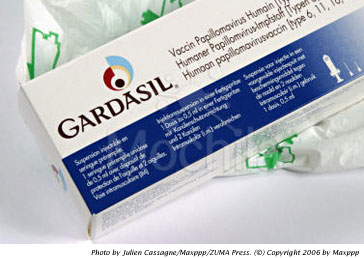
 (WOMENSENEWS)–Controversy persists over Gardasil, which protects against human papillomavirus or HPV, even as it enters more extensive use.
(WOMENSENEWS)–Controversy persists over Gardasil, which protects against human papillomavirus or HPV, even as it enters more extensive use.
Though the vaccine was approved for U.S. marketing in 2006 by the Food and Drug Administration, the question of whether it’s safe to have a pre-teen or teenage daughter or son immunized remains a core issue.
The Centers for Disease Control and Prevention recommends vaccinating girls and young women ages 9 to 26.
In October, the Food and Drug Administration announced their approval of Gardasil to provide protection against HPV for males in the same age group.
More than 23 million doses of the vaccine have been distributed as of 2008.
Gardasil is the only vaccine currently approved to protect against four types of the 100 or so strands of HPV. It is widely regarded as an effective intervention, as it’s cost effective and has the potential to stem often undetected and untreated incidents of HPV and cervical cancer for millions.
HPV is spread by direct contact and causes warts, including genital warts. Some types can also cause changes in the cervix that lead to cervical cancer. The tricky thing with HPV is that it is often undetectable, so women may not have any symptoms and only discover an infection through an abnormal Pap test result.
Even with the vaccine, regular screening for cervical cancer through Pap tests is recommended, as all women are not fully protected from getting cervical cancer with Gardasil.
Gardasil Compelling
The arguments for administering Gardasil are compelling. It protects against a virus responsible for 70 percent of incidents of cervical cancer, an illness that continues to kill approximately 4,000 women annually in the United States.
Dr. Kevin Ault, associate professor of gynecology and obstetrics at Emory University in Atlanta, speaks for many clinicians when he says the statistics favor Gardasil.
"There are 772 serious problems identified in 23 million doses of vaccine," he said in an August article on ABC News online. "I usually tell my patients that these serious events are tragic, rare and likely unrelated to the vaccine."
But because the vaccine is new, reports are still emerging as to its safety and the risks versus benefits of immunization for all teens.
A government report released in August 2009 raised the latest set of high-profile safety questions. It found that Gardasil was linked to 32 unconfirmed deaths since its release and higher incidences of fainting and blood clots than other vaccines.
An editorial in the Journal of the American Medical Association by Sheila Rothman and David Rothman accompanied the report. It suggested that the educational material for physicians about Gardasil did not address "the full complexity of the issues surrounding the vaccine and did not provide balanced recommendations on risks and benefits."
"Although the number of serious adverse events is small and rare, they are real and cannot be overlooked or dismissed without disclosing the possibility to all other possible vaccine recipients," Dr. Diane Harper, director of the Gynecologic Cancer Prevention Research Group at the University of Missouri told ABC News online in response to the report.
More Red Flags
Other research also raises red flags. Findings presented in May 2009 at the annual meeting of the American Academy of Neurology by researchers from the University of Medicine and Dentistry of New Jersey indicated that within two to six weeks after receiving an injection of Gardasil, females have heightened vulnerability to Guillain-Barre syndrome, a potentially deadly condition in which the body’s immune system attacks the nervous system.
They found that women who receive Gardasil are up to six times more likely to contract Guillain-Barre than people in the general population within six weeks of the treatment. The total numbers of those at risk are low, but it’s still unknown why Gardasil triggers this serious disease.
Once thought of as a lifesaver for low income and minority women, who average much higher rates of cervical cancer because of undetected HPV, the vaccine has been losing some of its initial luster as risks related to it usage become apparent.
Merck, with headquarters in Whitehouse Station, N.J., the manufacturer of Gardasil, maintains that its vaccine is extremely safe. Other proponents of the vaccine agree, saying it is well-tolerated. They report that the most common side effects in both men and women are simple pain or swelling at the injection site, headache, fever, nausea, dizziness, vomiting and fainting.
But reports of adverse events–health problems that occur after getting a vaccine, which may or may not be related to the medication–for Gardasil are about five times as high as the overall average for any vaccine, according to John Iskander, the Centers for Disease Control and Prevention’s associate director for immunization safety.
In 2009, Gardasil was linked to severe allergic reactions in at least five confirmed cases of young women in Spain and Australia.
Since the vaccine is new, reports on its safety are still emerging. Without enough evidence, though, it can be difficult for concerned parents to make an informed decision. One thing is clear: more research, study and discussion are needed.
Dr. Sharon Ufberg is a highly regarded integrative practitioner and health care journalist. She is an international leader and activist in issues of women’s health and safety and a delegate to the U.N. Commission on the Status of Women. She can be reached at sufberg@gmail.com
For more information:
CDC Q and A About HPV Vaccine Safety
http://www.cdc.gov/vaccinesafety/Vaccines/HPV/hpv_faqs.html
Note: Women’s eNews is not responsible for the content of external Internet sites and the contents of site the link points to may change.


